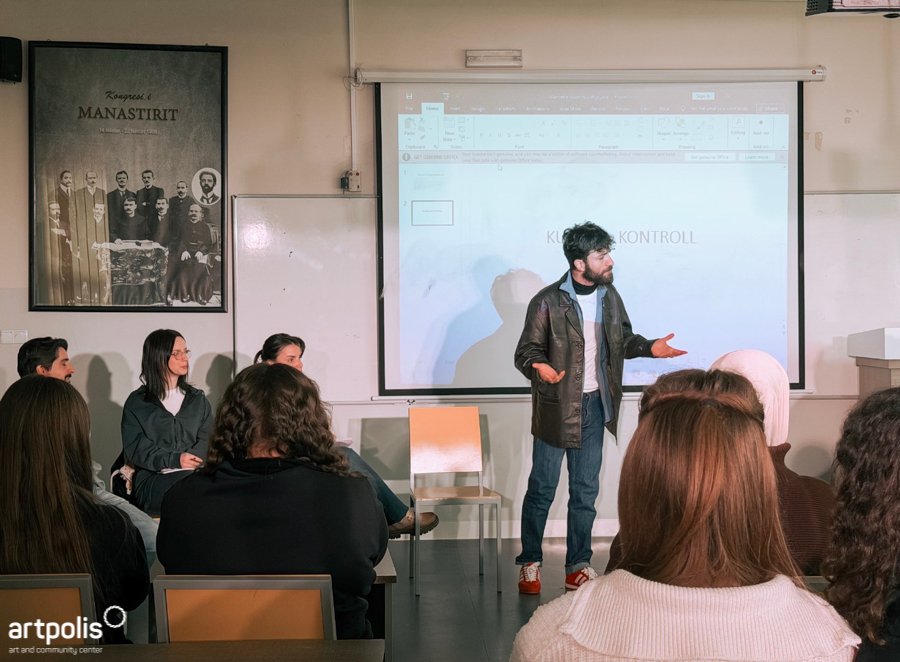
“Behind the Screen” in Vushtrri Highlights the Phenomenon of Online…
February 12, 2026
Activities Festivals Performances Representations
January 26, 2023

25.01.2023
Art and Community – Artpolis on January 25 presented theater performance “The Haunted Land” on the third night of the “Flaka e Janarit” Festival, supported by the Municipality of Gjilan and the Ministry of Culture, Youth and Sports.
“The Haunted Land” is a performance based on Shqipe Malushi’s poetry, evoking our collective memory about the absence of peace and confrontation with the war, which is a constant for Kosovar society throughout the centuries in particular, it is an impact on our intergenerational trauma.
Performed in a unique experimental format in Albanian and English, by the director Zana Hoxha’s performance creates a multidisciplinary synergy through Malushi’s imagery poems, Robert Nuha’s contemporary theater choreography, and Shpëtim Selmani’s dramaturgy, experimental music with a combine source of traditional and modern elements and singing, as well as, video projections that create a new narrative based on our collective memory.
“The Haunted Land” through chronological acts describes one of the most important stages of Kosovars toward what they had dreamed of for centuries, freedom.
But is it enough to be free? Or is there anything beyond it?
“The Haunted Land” is a photo album that should never be covered by dust, or forgotten in a drawer.
After the performance took lace the debate with the two panelists Josif Papagjoni – author of dozens of books on theater and drama, as well as Trina Hoti, a sociologist. Director Zana Hoxha, journalists and the audience were also involved in the debate.
“In this performance nothing is drawn. Neither Kosovo nor Gjakova is written anywhere and it is intended for the international audience. Today, just for this Festival everything has been completely translated into Albanian. We created this performance for 21 days. It was very challenging for the actors, because it is a theater of poetry, and here the challenge remains what we are saying, will the message reach the audience, the text does not communicate like other texts, but maintains it’s intimate, personal communication”, said director Hoxha.
While the panelist Hoti, as a young women and as a post-war generation in Kosovo, said: “I am a child that was born in 2000. Watching this performance, it is an education for me. The play takes up the idea of places in the memory, certain places of memory are presented, which are transformed into different geographical places. In the beginning, the individual, intimate, personal memory is shared, where the actors and actresses then in their group and chorus play, come together, they share memories with each other and from individual memories it is transformed in collective memory. Many memories are shifted on individual shelves. I think that in the creation of memory, we should also have differences between facts and memorialization. The show gives the message to share individual memories and as a country, we have a problem with the institutionalization of memory. The hand of the state is only formally. In the agenda, not much opportunity is given to family members to share their memories of the war, but only to politicians. The show institutionalizes the memory, makes it more comprehensive, and not only this aspect of the weapons, the army, the power, but also the memory of everyone, calling for the women and each person to share their personal experience and intimate memories”.
Josif Papagjoni shared some of his impressions, comments and analysis on the play mainly from the dramaturgy point of view.
“From the experience in the theater, we have rarely seen any performance outside of the classical one. In fact, in the 90s we experimented a bit. This performance, in terms of dialogue and speech, is not a drama at all, like a genre. It is a poetic body, a poetic theater, which has been experimented both in Albania and Kosovo, like Fadil Hysaj plays. I don’t know the poet well. I would like to read 5 or 10 staged poems right there and then to see the message more clearly. The final word of this performance is its direction. It left a great impression on me. I saw at the highest levels, the kind of poetic theater. We saw good intertwining of poetic text, music, and choreography. The model and episode of love like a wave, something fantastic, drums, cries, myths that shout and tell us you are this, keep this identity you have… It is a theatrical metaphor raised in choreography, music, image and poetic text, all harmonized in perfection. This kind of art creates magic. This is not the theater of speech. We understand many things through movement, painting, dancing… The homeland is where my home is. Here we are in art. We are not in journalism, jubilees, history. The text is poetic. There is the love for home, homeland, childhood… There are also remarks: some mess that was created and could not be heard well even by the spectators, then I thought that the performance is closing with the home, but it continued further and personally I would close it with the home”, said Josif Papagjoni.
The audience also shared a lot of positive comments, and criticism about the performance.